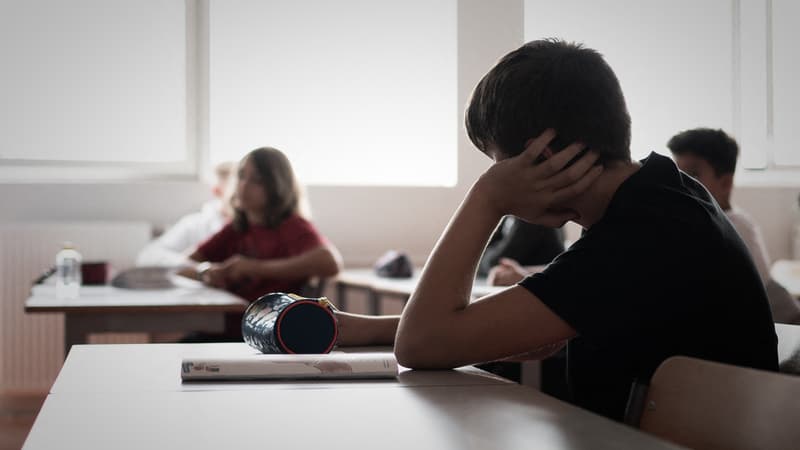We knew that the health crisis had sparked unrest among young people, but the data was lacking for children: a first national study revealed on Tuesday that 13% of children aged 6 to 11 have at least one probable mental health disorder .
This cross-sectional study, conducted by the French public health agency, crosses data collected at the end of the 2021-2022 school year from more than 15,000 children and teachers in almost 400 schools, as well as 10,000 parents. Until now, information on the health status of children was fragmentary or unrepresentative.
13% of children 6 to 11 years affected
Thanks to the questionnaires completed by different populations (parents, teachers and children), the “Enabee” study confirms that 13% of children between the ages of 6 and 11 have “at least one probable mental health disorder”. This is a prevalence rate of the same order as those observed in other European countries in the same age group.
“It does not surprise us, but the numbers are large enough to raise questions about this issue, for which until now we had no data,” Stéphanie Monnier-Besnard, an epidemiologist and project director of the Enabee study, told AFP.
Specifically, 5.6% of children have a “probable emotional disorder”, either an anxiety disorder (separation anxiety, generalized anxiety, specific phobias) or depression. About 6.6% of children have “probable oppositional disorder” (a particularly angry mood, quarrelsome, or defiant behavior). Finally, 3.2% present probable persistent inattention and/or hyperactivity disorder (ADHD).
The data does not highlight differences according to school level and school sector (public schools outside the priority educational networks (REP) and private schools versus REP or REP+ public schools).
This is a “first step” that allows “to enlighten public decision-makers with a view to future awareness-raising actions,” said Stéphanie Monnier-Besnard. In fact, repeated regularly, the study will make it possible to follow the evolution of the indicators, to assess the impact of possible events (infectious, environmental, etc.), to initiate preventive actions.
“You have to put the package”
This survey offers “a very useful picture of the current situation,” Professor Richard Delorme, head of the department of child psychiatry at the Robert-Debré hospital (AP-HP), told AFP. “Many times we tell ourselves that a child under 11 years of age cannot be depressed or that it only worries a part of the population, that is false,” he adds.
These “objective” data should make it possible, he hopes, to implement prevention policies: “one child in ten is concerned, the package must be put in place.” Especially towards parents. Because in the face of a saturated healthcare offer, they can play the role of first lookouts, monitoring indicators such as their children’s sleep or appetite, the doctor recommends.
The Minister of Health, François Braun, recalled the existence of the “My Support Psy” system, launched by the government in 2022 with the aim of counteracting the effects of the pandemic on the mental health of children: “children can benefit from 3 years of age of 8 reimbursable sessions with a psychologist”, recalled the minister.
Difficulty establishing a direct link to Covid-19
The Enabee study, carried out when the health crisis was still relevant, does not allow estimating a possible impact of Covid-19, given the lack of data prior to the crisis in this age group. A second, “complementary” survey, published this Tuesday by the Drees (Statistics Department of the Ministry of Health), shows that the psychological discomfort suffered by a growing minority of children and adolescents has been aggravated by this crisis .
This study, extracted from the 3rd part of the Epidemiology and living conditions linked to Covid-19 (EpiCov) survey, shows that between March 2020 and July 2021, 12% of boys aged 3 to 17 and 13 % of the girls have consulted a health center. professional for a psychological reason. Only 7% of the boys and 6% of the girls had already consulted before.
Taking into account the children who did not consult, but whose parents believe that they needed help for psychological difficulties and that this help was provided by a health professional, 15% of the children would have needed care for these reasons, the study adds. That’s almost one in six children.
Source: BFM TV


